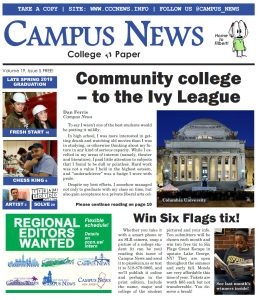By Darren Johnson
Campus News
One minefield us older adults have to gently navigate is when we find a young college arts grad who doesn’t have a real job a year, or two, after graduation.
The grad may have majored in fine art, sculpture, creative writing, dance, acting, music, and they walked across the stage for the degree — but then what?
There aren’t exactly jobs in these fields — not dream jobs, anyway. Not for 22-year-olds.
There may be related jobs — say the fine artist also does graphic design for an ad agency, or the writer takes a reporter’s job at a local newspaper — but many of these grads don’t want to compromise. They want to have a gallery show at the Whitney or pen that book that goes to No. 1 on the bestsellers list. At 22.

So they won’t compromise. They are making a go of it. Some move back in with parents. Some take jobs as waiters and baristas. They work just enough to afford the basics, spending the rest of their time on their art, and networking with like-minded dreamers.
And it’s complicated for us older adults to address this situation with the young aspirant.
On the one hand, we don’t know that the aspirant won’t be a big star. There are numerous examples of people who struck artistic gold while young. They didn’t compromise. They used their time — before becoming encumbered with mortgages and kids — to hone their craft. To put in the so-called 10,000 hours. We don’t want to disparage a potential Kurt Cobain or F. Scott Fitzgerald (who hit with “This Side of Paradise” at age 23).
At the same time, we know many older adults who gave up on their dreams too young. They took a job that robbed their soul — then got married, had kids — and they wake up one day, many years later, full of regrets. They may try to pick up that paint brush or guitar again, but they no long have it. They will always wonder what could have been.
So, discouraging the young artist — even if their student loans have come due — may be wrong, and irresponsible. There’s more to life than money.
On the other hand, though, chances are very high that they won’t make much progress toward their artistic dream. And then what? They will be 26 or 27 and their college degree won’t help them land a palatable entry-level white-collar job. College degrees have unofficial expiry dates. Their professors — who have connections in the industry — will have long forgotten them. Who will serve as reference? Starbucks? Ageism is a real thing, and the 22-year-old fresh out of college will be allowed much more leeway.
So these arts grads may be giving up on actually having a career. While they are dreaming, their more practical former classmates are spending their 10,000 hours learning Adobe, or CAD or how to win at office politics.
The grad who waits until age 26 or so may only be able to get predatory jobs like selling insurance. Aflac! How’s that for soul-crushing?
And, the reality is, most artists hit their stride later in life. Ernest Hemingway worked for newspapers and served in the military before his debut, “The Sun Also Rises,” hit in his late 20s.
Is it better to go the barista route or to work a job that keeps you somewhat in the game? For a writer, a newspaper job counts toward your 10,000 hours. You’re learning how to interview, write snappy leads, copy edit. For an artist, working in graphic design can teach you about the geometry of art, and colors.
So maybe it’s better to compromise a little now — and take a job that keeps you in your field — than to bum around, hoping someone important discovers your unfettered genius.
But it’s a tough discussion to have with the young arts graduate. To use a term from the last century, they may see you as “a sell-out” who joined the Church of Compromise and are trying to recruit them to the flock. To them, the person who suggests getting an office job is a dream-killer not to be trusted. They think we just don’t get it.
But maybe compromise isn’t the enemy of creativity. Maybe the starving artist is a cliche. Maybe it’s not so bad to have a few dollars in one’s pocket while learning a marketable skill. Because, after all, to be the next great artist or novelist may only take a couple of hours of focus a day. Cut out the smart phone screen time and Netflix and we’ve freed up more than enough time to come up with that masterpiece.
And, if it doesn’t happen, at least the young artist will have a palatable job to fall back on, to get a mortgage with, to support a family and oneself. A job that people who end up selling insurance will envy that person for.
Darren Johnson studied Writing at Southampton College of LIU.




Facebook Comments